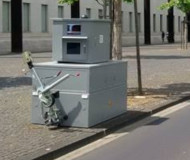7/11/2019
German Constitutional Court Questions Speed Camera ReliabilityEvidence from Jenoptik Traffistar 350 speed cameras ruled inadmissible by a German state constitutional court.

A German state constitutional court has found speed camera readings that cannot be independently verified violate the right to a fair trial. The Saarland Constitutional Court on Friday nullified a 100 euro (US $112) automated ticket and ordered officials to cover the 7500 euros (US $8440) in legal expenses a ticket recipient incurred while attempting to defend himself against a citation that arrived in the mail.
On October 12, 2016, a Jenoptik Traffistar 350 laser speed camera in the town of Friedrichsthal claimed that the defendant had exceeded the speed limit by 17 MPH. The unnamed man's lawyer demanded to see the raw, unencrypted data from the camera so that its measurements could be double-checked. While the full service history of the device was handed over, the camera purged all raw data, so an expert witness found there was no way to independently confirm the device's speed claims. At trial, the lawyer moved to have this unverifiable evidence suppressed. The Saarbrucken District Court rejected the request, saying the state did not have to prove its evidence was reliable, and the burden was on the defendant to refute the camera's speed claims.
The Saarland appellate court likewise rejected the driver's appeal, saying a German standards body had certified that the speed camera uses a standardized method to take measurements, and thus they were presumed to be accurate. The ticket recipient appealed to the constitutional court on the grounds that he was denied access to relevant evidence.
The Traffistar 350 speed camera does not store any raw measurements of distance and time, it just records the final speed estimate. The Physikalisch-Technische Bundesanstalt (PTB), the German standards body, confirmed that prior versions of the speed camera software retained all readings so that auditors could perform a plausibility check. PTB insisted that such checks were meaningless and that the camera's internal self-check mechanism was a sufficient guarantee of accuracy.
Engineering expert Johannes Priester disagreed in testimony before the court, saying it would be possible to perform a plausibility check against the raw data and that the camera's internal verification mechanism uses a proprietary algorithm that is a trade secret and cannot be verified. Checks of actual field measurements, he said, would be more valuable tests made under laboratory conditions because there is a possibility of interference not accounted for by the lab.
The constitutional court noted that past decisions upholding use of speed cameras were based on speed camera software versions that did record raw measurements. The court said what speed camera companies were doing now was the equivalent of a court convicting someone based on DNA evidence but immediately destroying the blood samples so that the DNA could be independently tested.
"The Constitutional Court considers that there is a lack of a fair constitutional procedure if an affected person -- even without further explanation -- challenges the measurement result and complains of a lack of raw data," the court concluded. "The constitution of the Saarland grants... a fundamental right to a fair legal procedure, which includes a fundamental right to effective defense."
A copy of the ruling in German is available in a 100k PDF file at the source link below.


